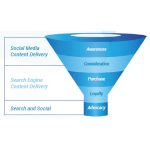Content Marketing Strategy Template

The creation of a content marketing strategy is critical to ensure you are publishing relevant information on the correct platforms to the right audience. It will also crystallise your motives and understand what success looks like. Without a strategy you are simply throwing darts at a moving target.
A content marketing strategy should also determine paid and non-paid content seeding pathways – including but not limited to native advertising, influencers, social media marketing and search engine marketing and traditional PR – to ensure the content you are creating is discovered.
The information found throughout Kudos Media’s Content Marketing White Paper should feed into your content marketing strategy development; however broadly, when you’re creating a content strategy you must consider the following.
Who What When Where Why:
Many brands engage in content marketing without truly understanding the who, what, when, where, why, how and as such, may either feel their content marketing is under-performing, or not have a good understanding of its performance.

Goals establishment, conversion identification and audience analysis are critical components of a content strategy. You should also consider the following:
- Why are we doing this?
- What is my budget?
- What does success look like?
- How will we measure that success?
- What is my 3-month, 12-month, 2-year and 4-year vision?
- What are the risks involved?
- Determine challenges or obstacles that can be expected.
- Who and where is my audience?
- What is my content style guide?
- Establish content voice, tone and messaging guidelines.
- How will we repurpose owned content?
- What is our content curation strategy?
- What paid and non-paid seeding channels will we use?
- Who can we collaborate with to achieve success?
- How will we implement and manage user generated content (UGC) and competitions?
- Do I need a specific social media strategy?
- What are the legal considerations?
- Who is my competition and how are they meeting or falling short of their audience’s needs?
- Will I monetise content through advertising? If so who are my competitors?
Establishing Content Marketing Goals:
Setting strong goals for your content marketing will help you establish KPIs and metrics as well as crystallise content marketing performance management and ROI measurement.
What do you want to achieve? What does success look like? What is the 3-month, 12-month, 2-year and 4-year vision?
Some common goals are:
✔ Drive sales
✔ Grow inbound enquiries
✔ Capture data
✔ Membership retention and growth
✔ Build communities (social media / forums)
✔ General branding, market presence and thought leadership
✔ Build web presence and traffic with SEO
Ensure you develop SMART GOALS
✔ Specific ✔ Measurable ✔ Attainable ✔ Realistic ✔ Time bound
Quantifiable goals, targets, KPIs and metrics should be established as part of your content marketing strategy and must be regularly tracked and measured to determine content effectiveness.
Goals are the foundations for your road map to content marketing success.
DOWNLOAD our Complete Content Marketing Guide
The Complete Content Marketing Guide is a 30-page white paper detailing all aspects of developing, refining and implementing a content marketing and marketing automation strategy.

Content Marketing Strategy Development
Establishing Content Marketing Goals
Audience Analysis
Marketing Automation
Content Metrics and ROI
– Digital Content Distribution:
– Social Media
– SEO
– Video
– E-Newsletters
– Content Seeding and Amplification
Print Content Considerations
Legal considerations




